- Home
- Rebecca York
Hero's Welcome (A Fantasy & Futuristic Romance Short Story)
Hero's Welcome (A Fantasy & Futuristic Romance Short Story) Read online
HERO’S WELCOME
A Fantasy & Futuristic Romance Short Story
by Rebecca York
Main Menu
Start Reading
Afterword
Decorah Security Series by Rebecca York
Praise for Rebecca York
About the Author
Contacts
Copyright
HERO’S WELCOME
He was taking a risk. He could lose everything—the estate he’d been given and all the severance pay he’d invested in it. There was no guarantee he’d ever make a farmer. Still, Ben-Linkman felt a rush of pleasure as he activated the breaker jets and eased the bulky air truck downward fifty more meters for a better view of his property.
“Mine. The spoils of war.” He said the words aloud, savoring them as he swooped low over the small lake, winking in the greenish glow of the late afternoon sun, then circled the sprawling house. Catching his breath, he swung away from the landscaped grounds and roared over the broad, flat fields where oil-rich rokam had once grown.
Coming here was a huge gamble. He was betting everything that he could bring the land back to life. But could he? Did he have it in him? What if he failed? What if he—
Determinedly, he cut off the thought and set the air truck down behind the house. This was no time for second thoughts, and if he didn’t want to lose the place to an enterprising thief, he’d better activate the security perimeter.
He rolled his shoulders, fatigued from flying the heavy government surplus ship eight hundred klicks from Spenserville, formerly Halindish. The city, which had been a Farlian provincial capital, had been recently— triumphantly—renamed after a legendary Dorre war hero.
Reaching behind his seat, he picked up his weapons and checked them: the small laser gun in the hip holster and the larger projectile rifle. High command had told him that gangs of deserters might be hiding in the hills. He wasn’t about to let them catch him by surprise.
The hatch beside him swung open with a push, and he levered himself out of the opening, stifling a groan as cramped muscles stretched. The real pain came when he touched ground. He forgot to lock his bad knee, and it crumpled under him, sending a jolt of pain all the way down to the nonexistent toes. Gritting his teeth against a scream, he stood with his hands balled into fists.
The pills they’d given him were in his backpack. He could take one. Just one.
“No.” He said it aloud.
He’d seen what happened when men started relying on the medication. They ended up needing more and more of the stuff, until their brains were so fried, all they could do was sit and stare into space. The pills were a one-way ticket to Farlian hell. He wasn’t going that route.
Teeth still clenched, he walked to the back door of the large, well-proportioned house and worked the key pad with the combination they’d given him.
Inside, he paused to absorb the silence of the wide corridor before switching on a power light. Then he made his way to the central living area, where he took a quick look at the woven rugs and the graceful furniture. Expensive, he thought, running his hand over the glossy, red-brown kardin wood.
Glancing toward the small window, he saw that the light was fading. If his people, the Dorre, had built the house, there would be skylights in the vaulted ceiling. The estate had been confiscated from Farlians, though, which meant it was constructed to allow in only minimal outside light— like the caves Farlians had occupied to escape predators on the planet where they’d first landed after leaving Earth. Hundreds of years of cave dwelling had changed their eyes so that Farlians saw better in the dark.
A neat trick, but it hadn’t won them the war.
Turning right, he headed for the control center. His father had been the maintenance supervisor in a rich Farlian household, so the equipment was familiar. In minutes he’d brought up the main computer and checked the circuits. About half the estate’s power units, including the security perimeter, were working. He’d fix the rest tomorrow, after a good night’s sleep. Tonight, he’d just do a sensor check.
First he scanned the grounds and detected nothing bigger than a tree sneep. When he checked the house, though, his hand froze on the controls. Eyes narrowed, he went through the drill again, but the screen didn’t change. There was a Farlian in the house.
A wave of anger and hatred surged through him. Farlian and Dorre might come from the same human stock and claim Earth as their common ancestral home, but the only thing they had in common anymore was the war they’d fought for the right to rule Thindar.
Six months ago, just before the armistice, one of the slat-eating bastards had caught him below the knee with an energy blast that injected tissue poison. Amputation from the wound down had saved his life, but it hadn’t stopped the pain that continually invaded the rest of his leg. Nor had it lessened his rage at Farlians.
If it weren’t for the oppressive bastards, the Dorre never would have been forced to go to war. After abandoning the inhospitable planet where they’d lived, the Farlians had migrated to Thindar and colonized it. When the Dorre had arrived a hundred years later, on a generation ship from Earth that was at the end of its resources, the Farlians had saved his people’s lives with food and medicine.
Then, when the newcomers had begun to prosper, the Farlians, afraid of losing power, had passed laws that made it impossible for Dorre to enter good schools, hold office, or even own property. A caste system had developed; his people were forced into the underclass—while the Farlians had consolidated relations with other space-traveling races, creating off-world trading partnerships, all the while growing ever richer and more arrogant.
Until the Dorre had risen in rebellion.
From the console, Link silently switched on some lights. Then he moved quietly toward the storage compartment where the sensors indicated the intruder was hiding.
His hand on the pressure trigger of his gun, he yanked open the metal door, nearly killing the Farlian behind it before seeing it was a female. A mane of red hair hid her face.
Grabbing her by the sleeve, he wrenched her into the open and tossed her onto the floor. She lay curled away from him, her ivory skin blotched by fear, her slender legs trembling visibly below a short tunic. Yet it was with regal bearing that she sat up and swept the fall of hair away from her exotic green eyes.
The sight of her familiar features knocked the breath out of him. “Kasimanda!”
She’d been beautiful as a child, more so as an adolescent. But now . . . by Atherdan, she was stunning. The pale skin, the cat-like eyes, and the wild red hair created a vision that called to him with a familiar, forbidden longing. For an instant, he wondered if this was really her or some dream from his subconscious come to life.
Her gaze flicked from his face to the laser pistol in his hand. “Would you kill me, Link?” she asked in that musical voice he instantly discovered still had the power to stir his senses.
He pulled himself together. “Why shouldn’t I? This is forbidden territory for a Farlian.”
Doubt kindled in her eyes. “We were . . . friends.”
“Friends.” He threw the word back at her. Dorre and Farlian could not be friends. Yet he and the highborn Kasimanda of Renfaral had played together as children. And when they had reached adolescence, he had longed for more than friendship.
His eyes must have given him away, because he saw her relax a fraction.
“How did you get here?” he demanded.
She pushed herself off the floor and stood facing him defiantly. “Bribes.”
“I hope you didn’t spend too much, because you’re
leaving. Now,” he said, emphasizing the last word.
She shook her head. “No.”
He made his voice flat and hard. “You can’t stay.”
Her shoulders slumped. “Then kill me now.”
“I don’t kill women.”
“No?” She raised her chin. “A Dorre raiding party killed my mother and sister. Are you so different?”
Sickened, though not surprised, by the news, he asked, “And they spared you?”
He saw her stiffen, swallow. “My mother pushed me into the refuse chute as they were coming through the front door. They didn’t find me.”
He tried to imagine Kasimanda of Renfaral hiding among the household garbage. Unthinkable. Yet he could see from her eyes that it was true—that and maybe worse.
“Why did you come here?” he demanded.
“To work.”
He gave a short, sharp laugh. “You? Work?”
“Yes. The place was a mess. I cleaned it. I can keep it for you. I can cook. And I can help you with the rokam.”
“Let me see your hands.”
She kept her eyes on him as she held up her hands for inspection. He remembered them being soft and white, the hallmarks of a pampered woman. Now they were red and chapped.
Before he could comment, she went on quickly. “I was studying botany at the Grand Institute when the war started. I know about rokam. It’s temperamental. You could lose the whole crop if you plant at the wrong time or if the minerals in the soil are out of balance.”
He gave a tight nod. He knew the risks.
“I—”
“How did you get inside the house?” he interrupted her.
“I visited this estate several times before the war. I knew the access codes.” With a gesture toward the south-facing window, she added, “I sold the ring my father gave me on my Passage Day—and some other things from the estate. With the last of the credits, I paid for a ride as far as the river.”
His eyes narrowed. It was thirty klicks to the Little Jodda and two hundred klicks to the nearest settlement. “Some damn fool flyer pilot left you in the middle of nowhere?” he asked, his anger rising.
She gave a little nod.
“This is dangerous territory. You could have died if a storm had caught you on the plains. Or you could have run into a gang of deserters,” he ground out, imagining the worst. “They’re desperate. Dangerous.”
“I have a laser gun.”
“Weapons are forbidden to Farlians.”
She met his gaze with steady eyes. “Are you going to turn me in?”
He heaved a sigh. “No.” When she let out a little breath, he fixed her with a quizzical look. “How did you find me?”
“A woman who worked for my father is in the office where they keep information on troopers, and after . . .” She stopped, started again. “After I’d been on my own for a couple of months, I went to her, and she looked up your record.”
“Why me?”
Her gaze dropped to the floor. “My parents and my sister are dead. So is my brother. There isn’t anyone else. And my options are very limited.”
“You’re well educated. A lot better than me,” he said. “Surely you can find something to do.”
“Not many people are hiring ex-Farlian nobility.” A shudder went through her. “There are houses where young women of my station entertain Dorre men. I would rather starve.”
He struggled to keep his expression impassive as she continued.
“I won’t beg you to let me stay, Link, but . . . I’ve brought something for your leg.”
The blood drained from his face. Farlian hell, she knew about that, too.
“I bought some salve Farlian soldiers use,” she whispered. “It draws out the poison.”
His eyes widened. “There’s a cure? Give it to me!”
“It’s . . .” She stopped, shook her head. “They were testing it. I don’t know if . . .”
He turned away so she wouldn’t see the crushing disappointment in his eyes. An experimental drug. Probably it didn’t work.
His jaw rigid, he stomped out of the room—to the extent that his limp allowed for stomping. He’d come here to hide his ruined body— from others or from himself, he wasn’t sure. He didn’t know how to cope with either the sudden reminder of the man he’d once been or with the false hopes she offered.
He threw his pack onto the floor in the hall and sprawled on the steps leading upstairs. Cursing under his breath, he rummaged in the pack. When his fingers closed around the tube of dried brew malt, he made a grateful sound. Not quite as good as pain pills, but it would do. He set the tablet in a plastic cup, poured in water from the bottle he carried, and watched the brew sizzle. Before the head rose, he began to drink. It was cheap beer, laced with brandy extract. In minutes he was feeling almost calm.
Almost calm enough to face Kasimanda as she came down the hall, carrying a small plate.
“You should eat,” she murmured.
He acknowledged the advice with a grunt as she set the plate beside him. His resolve to ignore her wavered when he smelled nester cakes. Her family’s cook had made them, and Kasi used to sneak them to him.
“You made these?” he asked.
“Yes.”
He took a bite, wondering when and how she’d learned to cook. The cake was crisp and meaty, the way he remembered.
Tipping his head to one side, he peered at her through a brew-induced haze. “These are good. My compliments to the chef.” His words slightly slurred, he asked, “But what if cooking and cleaning and tending rokam isn’t enough? What if the one-legged man wants you in his bed?”
Her face went white.
“I see. The rules have changed, but I’m still not good enough for you.”
She knitted her hands together in front of her. “I . . . can’t.”
The way she said it made him shudder. “Kasi?”
He put out a hand toward her, but she was already darting out of his reach, fleeing down the hall. He stared after her long after she’d disappeared.
Finally, with a heavy sigh, he made another cup of the strong brew. A shame to waste good nester cakes, he decided, cramming another into his mouth and licking his fingers. Sometime later he found the strength to get up and stagger down the hall to a bed chamber. Fumbling clumsily, he unstrapped his holster and shoved his gun under the pillow.
There was a mirror on the wall, and his reflection took him by surprise: A tall, dark-haired man with broad shoulders, his face too young for the pain-etched grooves in his forehead. He couldn’t remember the last time he’d looked at his own face. It was changed, and not for the better.
Turning quickly, he pulled off his trousers before easing off the prosthetic extension of his ruined leg. Freed of its constraint, the stump throbbed, and he bit back a groan as he flopped onto the bed.
He must have slept. The next thing he knew, he was awake and listening to stealthy feet moving in the darkness. His hand shot to the gun. The intruder was quicker, surer. He heard the weapon clank onto the stand beside the bed.
“It’s all right,” Kasimanda whispered.
Some of the tension went out of him. In the semi-darkness, he could see her only in outline. When he remembered she could see him a lot better, his stomach knotted. “What’re you doing here?” he growled, trying to pull the bedding over the stump of his right leg.
Her hand covered his. “Lie still.”
He felt the mattress shift as she came down beside him. “I’m going to take care of the wound.”
“No.” He tried to slide away, but one of her hands gripped his shoulder, stilling him. When the other hand touched his ruined flesh, he went rigid. “Don’t.”
“It’s all right,” she answered, a quaver in her voice. “I understand.”
He uttered a short, humorless laugh. “Yeah? And how in Atherdan’s name could you understand? What have you lost?” The instant the words left his mouth, he regretted them. Consumed by pain and humiliation, he’d fo
rgotten what she’d told him only a short time ago, that, indeed, she’d lost everything.
She didn’t reply, only stared at him. He couldn’t hold her gaze, had to look away.
For several more moments, silence hung in the darkness between them. Then her fingers flattened against his hot skin.
“Let me see if this salve works,” she whispered. “I want it to work. I want to give you that. Maybe it’s all I can give you.”
The soft sound of her voice kept him pinned to the bed as her hand glided over his leg, spreading some kind of cream. At first her touch brought him pain, and he clenched his teeth to keep from wrenching away. But in a few moments he felt something else: deep, comforting warmth, radiating through his skin, penetrating all the way to the bone.
Still, as her hand moved lower, toward the place where the energy burst had charred his flesh, he felt cold sweat break out on his forehead.
She kept talking to him in a low voice, words he couldn’t quite catch. Yet they held him. He wanted to close his eyes, to pretend that the darkness hid his mangled body. At the same time, he wanted to turn on a light, so he could see her delicate features. He settled for straining his eyes, watching her bending over him, the long flow of her spectacular Farlian hair, with its rippling waves, curtaining her face.
“Is it doing anything?” she asked, her voice giving away her tension.
“I . . . think so.”
“Good.” The word eased from her lips like a long, satisfied sigh.
He reached toward her, but before his hand could connect with her flesh, she sprang away. For a moment she stood looking down at him, then she turned and ran out of the room.
The next morning, he might have chalked the whole thing up to fevered dreams, except that he could see the orange salve on his leg. He also felt a difference in the wound. The pain was less gnawing.
He limped to the bathroom, using the folding crutch they’d given him in the hospital, and took a quick shower, bracing his back against the curved wall and standing on one leg. When he had carefully dried the stump, he attached the prosthesis and braced for the hot pain that always came when he first put his weight on the damned thing.

 Escape Velocity (Off-World Series, Book 7): Sexy Science-Fiction Romance Novel
Escape Velocity (Off-World Series, Book 7): Sexy Science-Fiction Romance Novel Hunter (Decorah Security Series, Book #20): A Paranormal Romantic Suspense Novel
Hunter (Decorah Security Series, Book #20): A Paranormal Romantic Suspense Novel Christmas Miracle 1935
Christmas Miracle 1935 Wyatt
Wyatt Unforgettable Christmas Dreams: Gifts of Joy
Unforgettable Christmas Dreams: Gifts of Joy Hollow Moon
Hollow Moon Cursed: Decorah Security Book #21
Cursed: Decorah Security Book #21 Bedroom Therapy
Bedroom Therapy Wyatt (Gypsy Magic Book 1)
Wyatt (Gypsy Magic Book 1) DIAGNOSIS: ATTRACTION
DIAGNOSIS: ATTRACTION Can She Get Home for Christmas
Can She Get Home for Christmas Dark Moon
Dark Moon Found Missing (Decorah Security Series, Book #14): A Paranormal Romantic Suspense Novel
Found Missing (Decorah Security Series, Book #14): A Paranormal Romantic Suspense Novel Fire on the Moon
Fire on the Moon Dark Powers
Dark Powers Midnight Caller
Midnight Caller Private Affair
Private Affair Guarding Grace
Guarding Grace Amanda's Child
Amanda's Child Phantom Lover
Phantom Lover Witching Moon
Witching Moon Talons of the Falcon
Talons of the Falcon Conquest (A Fantasy & Futuristic Romance Short Story)
Conquest (A Fantasy & Futuristic Romance Short Story)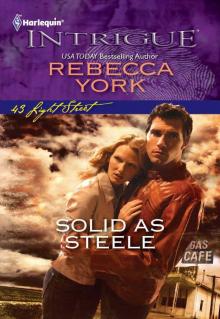 Solid as Steele
Solid as Steele Spellbound
Spellbound The Secret Night
The Secret Night For Your Eyes Only
For Your Eyes Only In Search of the Dove
In Search of the Dove Christmas Spirit
Christmas Spirit Never Alone (43 Light Street)
Never Alone (43 Light Street)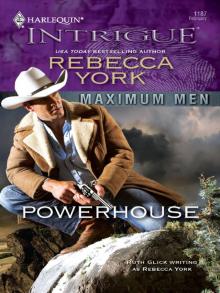 Powerhouse
Powerhouse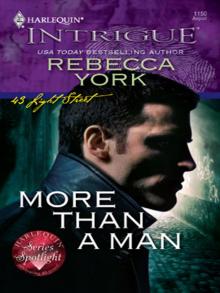 More Than a Man
More Than a Man Boxed In (Decorah Security Series, Book #16): A Paranormal Romantic Suspense Novel
Boxed In (Decorah Security Series, Book #16): A Paranormal Romantic Suspense Novel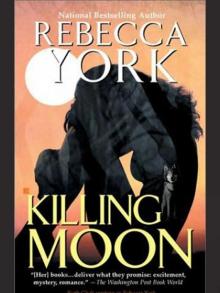 (Moon 1) - Killing Moon
(Moon 1) - Killing Moon Flight of the Raven
Flight of the Raven (Moon 2) - Edge of the Moon
(Moon 2) - Edge of the Moon Preying Game (Decorah Security Series, Book #15): A Paranormal Romantic Suspense Novel
Preying Game (Decorah Security Series, Book #15): A Paranormal Romantic Suspense Novel CARRIE'S PROTECTOR
CARRIE'S PROTECTOR Bad Nights
Bad Nights Beyond Fearless
Beyond Fearless Out of Nowhere
Out of Nowhere Undercover Encounter
Undercover Encounter Royal Lockdown
Royal Lockdown Destination Wedding
Destination Wedding Chain Reaction
Chain Reaction Dark Warrior
Dark Warrior Body Contact
Body Contact Terror Mansion (Decorah Security Series, Book #12): A Paranormal Romantic Suspense Novella
Terror Mansion (Decorah Security Series, Book #12): A Paranormal Romantic Suspense Novella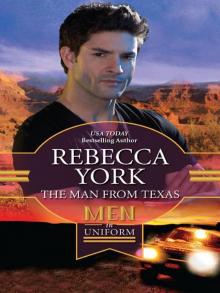 The Man from Texas
The Man from Texas Father And Child
Father And Child THE OFF WORLD COLLECTION (Short, Steamy Science Fiction Romances) (Off-World Series)
THE OFF WORLD COLLECTION (Short, Steamy Science Fiction Romances) (Off-World Series) Sudden Attraction
Sudden Attraction Bedroom Therapy: A Hot Romantic Suspense Novel
Bedroom Therapy: A Hot Romantic Suspense Novel Sudden Insight
Sudden Insight Hero's Welcome (A Fantasy & Futuristic Romance Short Story)
Hero's Welcome (A Fantasy & Futuristic Romance Short Story) Chained
Chained Desperate Magic
Desperate Magic Outlaw Justice (Decorah Security Series, Book #13): A Paranormal Romantic Suspense Novella
Outlaw Justice (Decorah Security Series, Book #13): A Paranormal Romantic Suspense Novella From the Shadows
From the Shadows Dark Magic
Dark Magic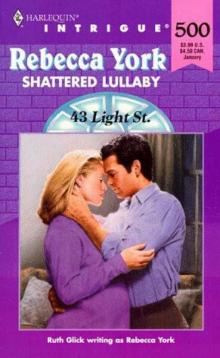 Shattered Lullaby
Shattered Lullaby Hot and Dangerous (Decorah Security)
Hot and Dangerous (Decorah Security) DARK MOON (Decorah Security)
DARK MOON (Decorah Security) Shattered Magic
Shattered Magic Hot off the Presses
Hot off the Presses Her Baby's Father
Her Baby's Father Hunting Moon (Decorah Security Series, Book #11): A Paranormal Romantic Suspense Novel
Hunting Moon (Decorah Security Series, Book #11): A Paranormal Romantic Suspense Novel AMBUSHED
AMBUSHED Betrayed
Betrayed Riley's Retribution
Riley's Retribution Cradle and All
Cradle and All BRIDAL JEOPARDY
BRIDAL JEOPARDY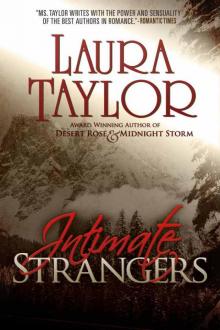 Intimate Strangers
Intimate Strangers Ghost Moon
Ghost Moon